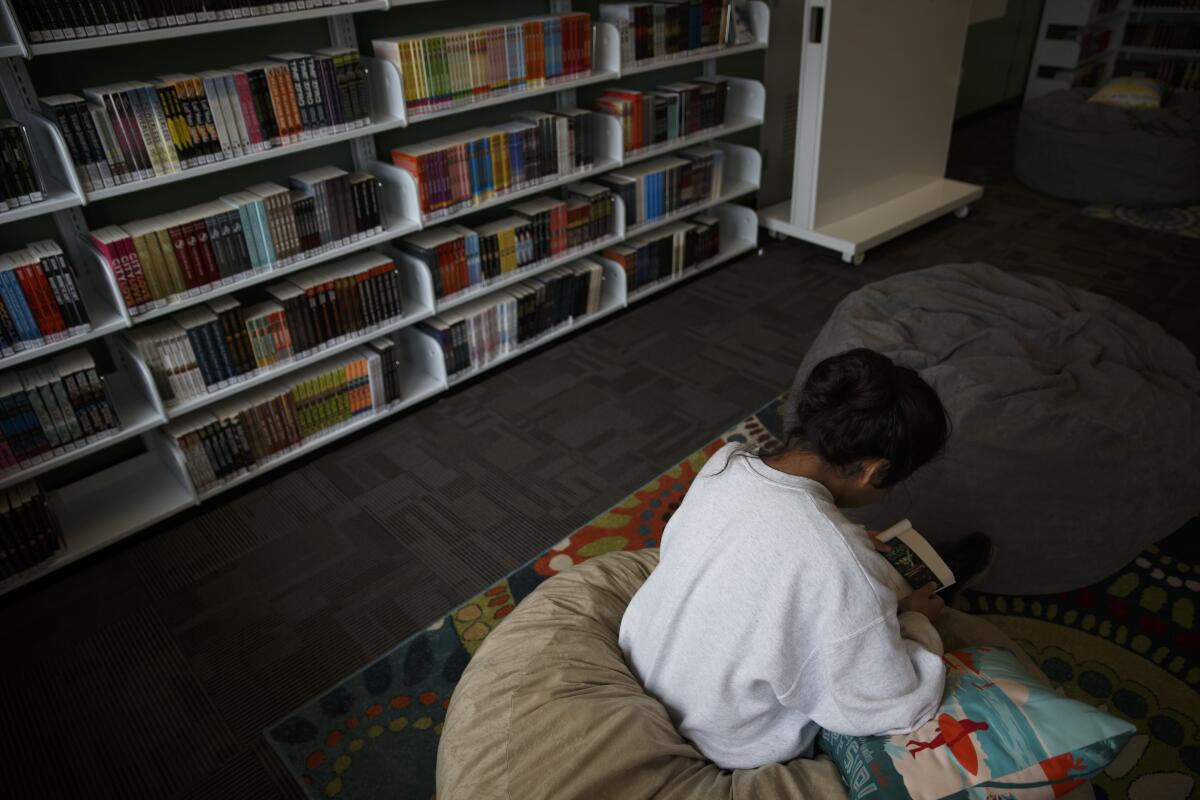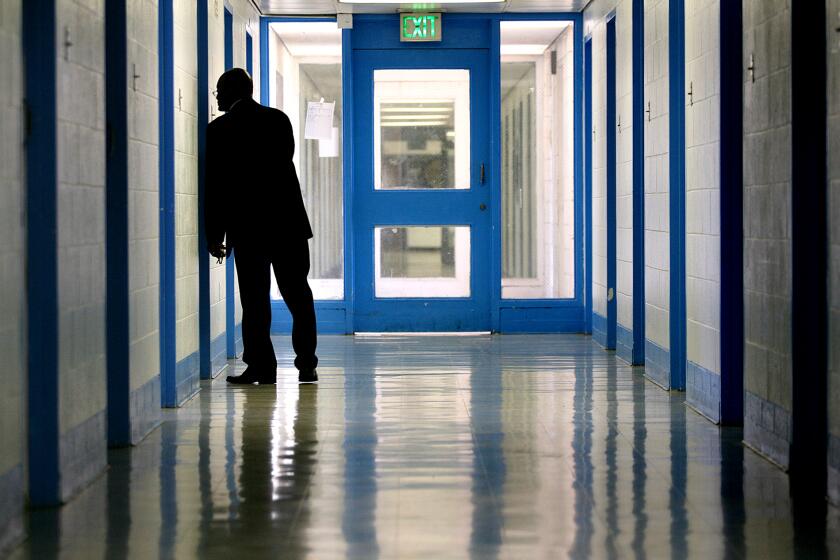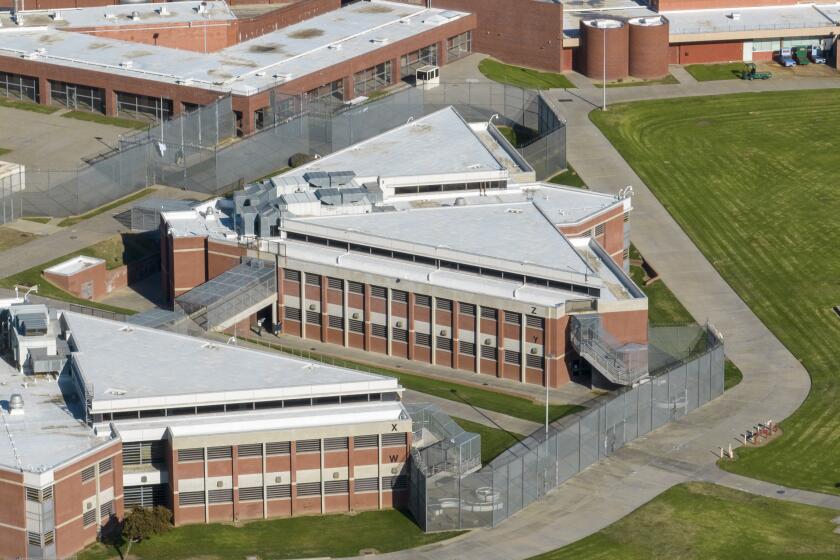As L.A. County moves youths out of troubled juvenile halls, will anything change?

- Share via
The last time Los Padrinos Juvenile Hall housed some of Los Angeles County’s most troubled youths, it was mired in scandal and pegged as obsolete.
Two months before county officials locked the doors at the Downey facility in July 2019, prosecutors charged six probation officers who worked there with assault for dousing teenage girls with pepper spray. It was part of a broader series of excessive force allegations that led the California attorney general’s office to sue to place a monitor over the L.A. County Probation Department.
State regulators had given L.A. County multiple opportunities to bring the juvenile facilities in Sylmar and Boyle Heights into compliance.
But later this month Los Padrinos will reopen — something of a last resort after a state oversight board ordered most youths out of L.A. County’s two remaining juvenile facilities following a staffing crisis, reports of a long decline in conditions and the death of an 18-year-old from an apparent drug overdose.
By July 23, the Probation Department must move the 277 juveniles now held in Central Juvenile Hall in downtown L.A. and Barry J. Nidorf Hall in Sylmar to Downey, as the troubled agency tries to right itself after years of disarray.
While the majority of youths must be moved out of Central and Nidorf halls due to the Probation Department’s failure to meet California Board of State and Community Corrections (BSCC) guidelines, youths convicted of severe and violent offenses will remain in the Secure Youth Treatment Facility at Nidorf as well as Campus Kilpatrick in Malibu. The BSCC does not have jurisdiction over these roughly 75 youths..
Los Padrinos represents a partial reset for the department and its new chief, Guillermo Viera Rosa. But some observers are worried the move to Downey won’t do anything to mitigate the department’s core issues.

Milinda Kakani is a member of the L.A. County Probation Oversight Commission and director of youth justice policy at the Children’s Defense Fund. She said the BSCC took action against Central and Nidorf because of problems caused by the continued staffing crisis, which will almost certainly follow the department to Downey.
“If we look at the violations that led to the closures, the majority ... were connected to the institution running the facility,” she said. “If we’re talking a lack of recreation, if we’re talking about a lack of programming, a lack of visitation, overuse of solitary confinement — none of those things have to do with whether you’re at Barry J or Central. They have everything to do with the department.”
Probation executives, contractors and members of oversight bodies including the L.A. County Board of Supervisors have been granted access to Los Padrinos in recent weeks. However, the department declined to allow a Times reporter to tour the facility. County officials also rejected requests for records about the complex’s layout and construction, citing security concerns.
Fesia Davenport, the county’s chief executive officer, told supervisors last month that a $117-million renovation was taking place at “breakneck speed.”
An 18-year-old was found dead of an overdose Tuesday in an L.A. County juvenile hall, just weeks after a county report raised alarms about the facility. Hours later, a state agency issued a report recommending that the county’s juvenile halls be closed.
The Los Padrinos complex consists of 36 buildings occupying 26 acres, though only a few structures will be used to house youths, according to Karla Tovar, the Probation Department’s head of communications. There are nine dormitories, classrooms, a library, a large outdoor recreation area and a gym, she said.
The facility has 442 beds, far more than the number of youths currently in L.A. County custody. Youths will be transferred in small groups, but Tovar declined to provide any details, citing public safety concerns.
Those who have been inside the Downey facility recently gave positive, if tempered, reviews. Kakani said she was impressed by the amount of green space at Los Padrinos, especially given concerns about the lack of recreation time offered to youths at Central and Nidorf.
“It is definitely not what I would call a five-star hotel,” added Supervisor Kathryn Barger, who also recently toured the facility. “But I will tell you that it has been completely refurbished. “
Supervisor Janice Hahn, whose district includes Los Padrinos, said the facility, which had most recently been used as a shelter for young women, now resembled a “summer camp” with a curated library and spacious gyms.

More than half of the youths transferred to Los Padrinos will live in rooms with individual toilets, according to Supervisor Lindsey Horvath‘s office, a critical step after youths were at times left locked in their units with no restroom access at the other two halls.
When she recently visited Nidorf, Horvath said youths told her they were often denied bathroom access due to staffing shortages.
“So a towel would be thrown in their room for them to use the sink in their rooms instead of being able to access the restrooms,” she said.
But concerns remain about the department’s ability to properly staff the large space.
About 620 officers have volunteered to be transferred to Los Padrinos, but half of them are on limited duty due to medical issues, according to Kevin Woods, acting head of the Detention Services Bureau.
At a meeting of the Probation Oversight Committee last month, Woods said the staff shortage could, once again, hamper the agency’s ability to get young people into the classroom.
The department is required to transport youths to school on a regular basis under the terms of its settlement with the California Department of Justice. Probation officials recently asked the monitor not to enforce that provision until Aug. 31, according to court records. The request was denied.
After warning a shutdown was imminent, the state oversight board will now give L.A. County more time to fix the troubled facilities.
“If we have the significant call-out problem that we have now, then yes, it will definitely impede our ability to get them to school,” Woods said, referring to when staff don’t show up for assigned shifts.
Woods said he hoped more staff would start showing up at Los Padrinos, as they might feel safer coming to work and many would now have shorter commutes.
“Because these individuals were allowed to bid to Los Padrinos — had a desire to transfer to Los Padrinos — we think we’re going to see greater numbers,” he said.
The department will assign 362 officers to Los Padrinos, according to Tovar, while 116 officers will remain stationed at the Secure Youth Treatment Facility.
Hans Liang, president of the union representing probation officers, said safety remains a prominent worry among those headed to Los Padrinos, especially after the department barred officers from using chemical spray when the Downey facility reopens. He said he’s called on Viera Rosa to give officers more extensive training on de-escalation and self-defense as a result.
“Our concern is, they’re taking away a tool that is effective, if used properly,” Liang said. “So if you’re taking that away, what are you giving us?”
Staffing issues continue to plague Nidorf and Central. Weekend shifts are often undermanned, sometimes short by dozens of officers, making it difficult for youths to receive visits from relatives or even leave their rooms, according to documents reviewed by The Times and interviews with multiple probation officials.
The officials requested anonymity because they were not authorized to speak to the media and feared reprisal.
On June 25, Nidorf was in need of “staffing assistance today for all shifts, including visitation,” according to an email reviewed by The Times.
“We need approximately 35 full duty officers to assist us due to shortage of staff,” the email read. “Their duties will be to conduct safety checks, back-up staff, supervise ART class, visiting and church services.”
“It’s still terrible. Every weekend they’re dying for staff,” one high-ranking probation official said, adding that an “entire shift” of officers also called out of work at Central in recent weeks.
The juvenile halls are currently staffed by 895 officers, down from 1,018 in June 2021, according to figures provided by the Probation Department.
Tovar said the department is “redoubling our efforts to curtail call-outs and other unwarranted absenteeism.” Individual cases are being reviewed that could end with discipline or termination of officers who continually miss shifts, she said.
Concerns also remain about the department’s ability to be transparent with the oversight agencies monitoring its operation of Los Padrinos.
In mid-June, Viera Rosa ordered all probation staff to stop communicating directly with the attorney general’s office or the BSCC, though they are still allowed to report “potential legal violations” and interact with oversight staff visiting probation facilities.
“We are asking probation staffers to submit their comments and suggestions to the agencies through [a county email address] — but in no way does it prohibit them from engaging with CALDOJ representatives during site visits or prevent them from reporting potential legal violations to either agency,” Tovar said.
L.A. County Inspector General Max Huntsman and the state attorney general’s office declined to comment.
Despite Viera Rosa’s order, BSCC spokesperson Tracie Cone said an inspector has still been able to work with probation staff to make sure the hall is ready in time. The county passed a final building inspection in late June and can officially start moving youths in.
More to Read
Sign up for Essential California
The most important California stories and recommendations in your inbox every morning.
You may occasionally receive promotional content from the Los Angeles Times.














